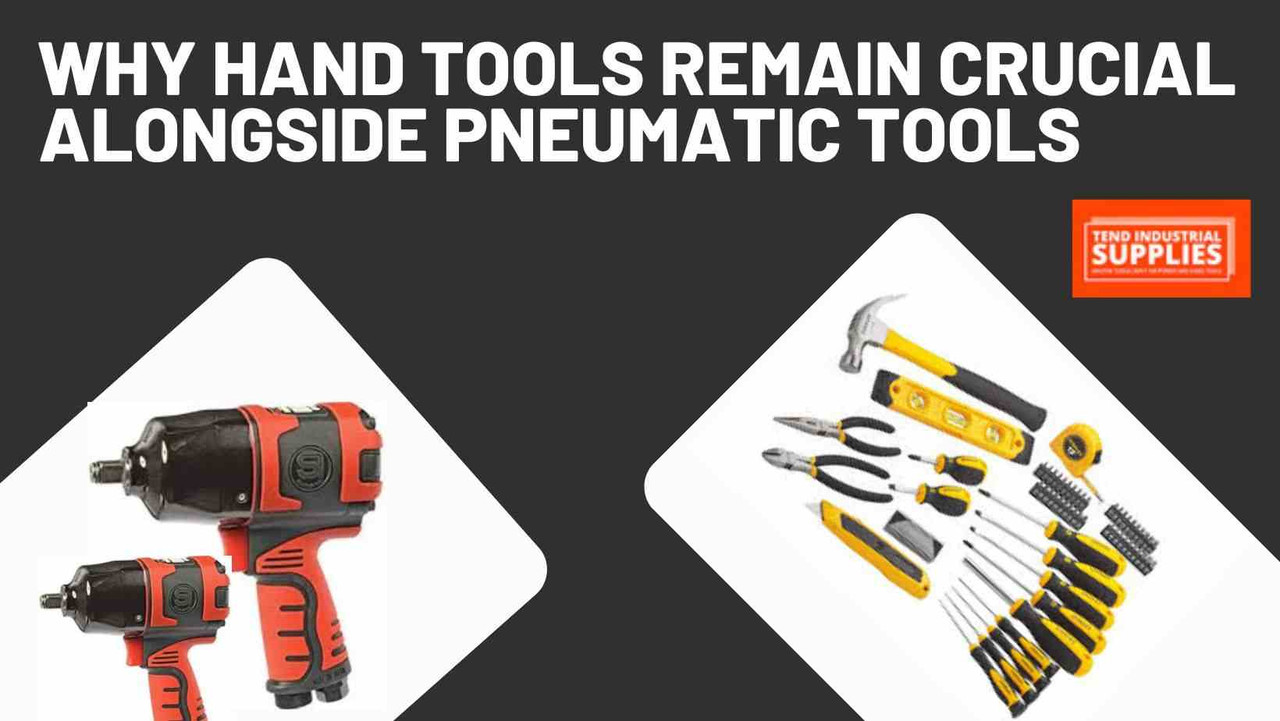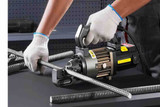Why Hand Tools Remain Crucial Alongside Pneumatic Tools
Introduction
In modern construction and manufacturing, the debate between hand tools and pneumatic tools' utility continues to be pertinent. Despite the rapid technological advancements that have made pneumatic tools a staple in most toolboxes, hand tools have retained their indispensable status for many reasons. This article explores why these traditional tools are still integral to crafting, repairs, and construction, offering a blend of precision, accessibility, and reliability that pneumatic tools cannot replicate.
Key Takeaway
Selecting the suitable air compressor is a balance of understanding your needs, the specifications required to meet those needs, and the cost implications of purchasing a new vs. used model. Invest wisely by considering long-term utility and maintenance over upfront cost savings to ensure your air tools operate efficiently and effectively for years.
Precision and Control
One of the most significant advantages of hand tools is their ability to provide unmatched precision and control. For tasks that require meticulous attention to detail, such as furniture restoration or intricate carpentry, the direct feedback and control over the tool allow for fine adjustments that are often unachievable with pneumatic options. Hand tools such as screwdrivers, chisels, and engraving tools enable craftsmen to perform delicate operations that demand a gentle touch and careful manipulation, ensuring high-quality, visually appealing, and structurally sound finishes.
Accessibility and Independence from Power Sources
Unlike pneumatic tools, which rely on compressors and specific setups, hand tools require no external power sources. This independence from electricity or compressed air is invaluable in scenarios where such amenities are unavailable—at remote construction sites, in outdoor settings, or in post-disaster environments where power failure is expected. Tools like hammers, saws, and wrenches provide the functionality needed to perform effectively across various environments, ensuring that work continues uninterrupted, regardless of local power availability.
Simplicity and Ease of Use
Hand tools score highly on simplicity and ease of use. With minimal setup required, these tools are accessible to individuals at all skill levels. Whether it's tightening a bolt with a wrench or measuring dimensions with a tape measure, the user-friendly nature of hand tools makes them suitable for both amateurs and professionals. Moreover, this simplicity accelerates completing tasks that might otherwise be delayed by the setup and calibration of more complex pneumatic systems.
Portability and Compactness
Hand tools' lightweight and compact design beats pneumatic tools when it comes to portability. Easily transported in a basic toolkit, hand tools can be swiftly moved from one job site to another. Whether climbing ladders, reaching into awkward spaces, or navigating cramped conditions, hand tools are readily available at your side. This portability is essential for tasks that demand flexibility and the ability to adapt to varying work conditions.
Durability and Low Maintenance Costs
Hand tools not only bring simplicity and ease of use but also stand out for their robustness and low maintenance requirements. They are generally more straightforward than pneumatic tools, which include moving parts and motors that may require regular maintenance. Tools made from high-quality materials can last decades, even with minimal care. Regular cleaning and proper storage are typically sufficient to maintain their condition. This longevity and reliability make hand tools a cost-effective investment for hobbyists and professional tradespeople.
Essential Hand Tools for Specific Tasks
Specific tasks in the workshop and on the construction site call for the unique capabilities of hand tools. Here are several indispensable types:
- Screwdrivers: Essential for driving and removing screws, available in various sizes to accommodate different screw heads.
- Hammers: Necessary for driving nails, fitting parts, and demolition activities.
- Saws: Hand saws and hacksaws offer precise control for cutting wood, metal, and other materials.
- Wrenches: These tools are perfect for gripping and turning bolts and nuts, with adjustable models providing a range of sizes in one tool.
- Pliers: Essential for gripping small items, bending wire, or cutting through materials.
- Tape Measures: Critical for accurate measurement in any project.
- Levels: Vital for ensuring proper alignment in tasks requiring precision.
Combining Hand Tools and Pneumatic Tools for Efficiency
Leveraging the strengths of both hand and pneumatic tools can significantly enhance productivity and efficiency. Here’s how combining these tools can be beneficial:
- Right Tool for the Job: Pneumatic tools are used for their speed and power in high-volume tasks such as sanding or large-scale assembly. Switch to hand tools for precision work that requires finer control.
- Maximizing Time: When setting up a pneumatic tool system, use hand tools to start prep work or smaller tasks immediately. This strategy minimizes downtime and keeps projects moving forward.
- Increased Versatility: A mix of hand and pneumatic tools expands the range of projects you can tackle, providing the right tool for every task and often reducing the need for costly specialized equipment.
- Cost-Effectiveness: Hand tools can be more economical for infrequent tasks or those requiring less power, not just in initial cost but also in ongoing maintenance and energy usage.
By understanding and utilizing the distinct advantages of hand and pneumatic tools, workers and hobbyists can optimize their workflows, reduce costs, and improve the overall quality of their work.
Purchasing Considerations
When it comes to expanding your toolkit, the decision to buy new versus used tools, understanding warranties, and balancing price with quality are crucial. Here's a detailed look at these considerations:
New vs. Used
Benefits of Buying New:
- Warranty Coverage: New tools often come with manufacturer warranties that provide peace of mind.
- Latest Technology: Benefit from the latest advancements in tool performance and efficiency.
- Reliability: Less likely to encounter operational problems compared to used tools.
Risks and Benefits of Buying Used:
- Cost-Effective: Significantly cheaper than new models.
- Inspection Needed: Requires thorough inspection to ensure functionality, which can be a drawback if you're not experienced.
- Potential for No Warranty: Many used tools are sold as-is, without warranty protection.
To mitigate these risks, always inspect used air compressors thoroughly or consider certified refurbished models with a warranty.
Warranty and Support
- Warranty Length: Look for warranties that cover at least one year or more, ensuring that any manufacturing defects will be handled.
- Comprehensive Coverage: Understand what the warranty covers. Some warranties are limited and won't cover all parts or types of damage.
- Support: Good customer support can significantly enhance the value of your purchase, assisting with installation, maintenance, and troubleshooting.
Price vs. Quality
- Balancing Act: It's crucial to balance the initial cost with the air compressor's operational lifespan and maintenance needs.
- Investment in Quality: High-quality tools may cost more upfront but typically offer greater reliability and longer lifespans, reducing the total cost of ownership.
- Consider Usage Frequency: For infrequent use, a lower-cost model might suffice. However, for regular or commercial use, investing in higher-quality equipment will pay off in terms of durability and efficiency.
Conclusion
Choosing a suitable air compressor involves careful consideration of your specific needs, the tools' specifications, and how much you're willing to invest initially versus long-term. By understanding the different types of compressors, key specifications, and how to balance cost with features, you can make an informed decision that ensures you get the best return on your investment.
Call to Action
For top-quality air compressors that combine affordability with performance, visitTend Industrial Supplies. Whether upgrading your workshop or outfitting a large industrial operation, our expert team is here to help you select the perfect compressor. Contact us at sales@tendsupplies.com for personalized advice or to learn more about our range. Share your experiences and challenges, and let's optimize your operations together!
FAQs
What should I look for when buying a used air compressor?
- Inspect for any signs of wear or damage, verify the age and usage history, and test the compressor to ensure it operates efficiently. Check if any repairs are needed and whether the cost will fit within your budget including future maintenance.
How often should I perform maintenance on my air compressor?
- Regular maintenance should include daily checks for leaks, monthly checks on air filters, and an annual check-up that involves changing the oil, checking belts, and thoroughly cleaning air filters and vents.
Can a higher CFM rating substitute for a higher horsepower?
- Not necessarily; while CFM measures the volume of air a compressor delivers, horsepower reflects the compressor's motor strength. Both need to be adequately matched to the tools' requirements for optimal performance.
Are there environmental considerations with using air compressors?
- Yes, choosing energy-efficient models reduces operating costs and minimizes your carbon footprint. Consider electric compressors for indoor use, as they emit no fumes, unlike gas-powered options.
What is the advantage of having a compressor with a larger tank size?
- A larger tank holds more air and allows you to use tools longer without waiting for the compressor to catch up. This is particularly useful for high-demand tools like sanders and grinders.









